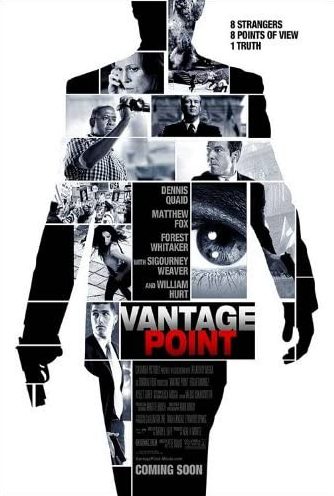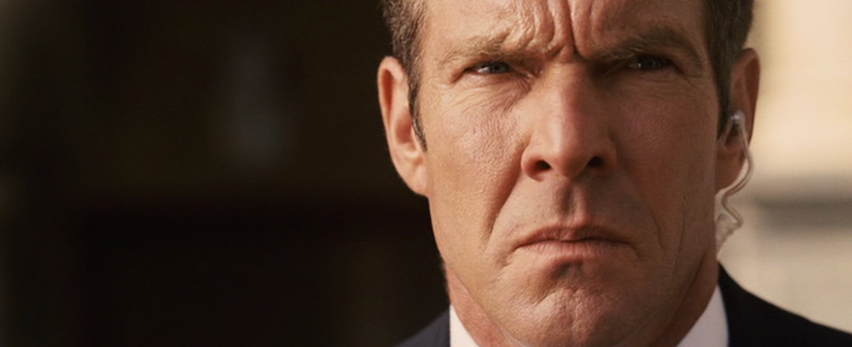

“The beauty of American arrogance is that they can’t imagine a world where they’re not a step ahead.”
The opening scene of Pete Travis’s Vantage Point is so good that even knowing what is about to happen—minor spoiler: the President of the United States is assassinated—it is completely gripping. Unfortunately, after that, the film is nearly over. This is because the narrative trick that the writers utilize is to tell this same episode from the perspectives of a handful of characters, including the President (William Hurt), two Secret Service Agents (Dennis Quaid and Matthew Fox), a civilian with a video camera (Forest Whitaker), and a news producer (Sigourney Weaver). Going into the film, you probably already know that the President gets shot, but you might not know that you will be sitting through the President getting shot half a dozen times before the film is through its brief runtime. If I was feeling uncharitable, I would say that it gets increasingly boring as the scene is examined from each new angle, but I don’t think that’s fair. It remains thrilling, but each new wrinkle feels generally predictable. And, even though the story grows a bit more complex with each iteration, it leads to a silly car chase scene that wipes out any dramatic tension the film had built up. The narrative device of multiple perspectives on the same story is one that has been utilized elsewhere, in films like The Usual Suspects and Gone Girl, but these works all trace their lineage back to Akira Kurosawa’s Rashomon. Let me assure you, Vantage Point does not hold a candle to Rashomon.
The first angle from which we witness the hit on the President is through the eyes of a news crew, led by Rex Brooks (Weaver). They are reporting on the anti-terrorism summit in Spain, at which the President is scheduled to give a speech. She is having enough trouble getting her news anchor to stay on topic and her cameramen to refrain from filming crowd members holding divisive signs, and then the shots rip through the air and knock the President off his feet. Everyone panics as they try to continue their coverage of the event, but then two separate explosions occur, the latter of which kills the network’s reporter (Zoe Saldana). We then are shown this same episode from four new perspectives, those of Secret Service Agent Thomas Barnes (Quaid), Spanish policeman Enrique (Eduardo Noriega), tourist Howard Lewis (Whitaker), and President Ashton (Hurt). Each new iteration takes us slightly further into the future and offers a few new clues to unlock the story. The last segment jumps around between several points of view (totally abandoning the structural concept of the first hour of the film), namely those of the terrorists carrying out the attack, and takes the story to its tidy conclusion.

The film fumbles pretty much everything other than its action scenes, which are quite good even though they often feel misplaced amidst the repetitious story. The dialogue is mostly clichéd, the motivations of the terrorists are never revealed, and the contrived nature of the plot is just too silly to take seriously. Let me illustrate the inanity of the plot. The film’s climax involves Agent Barnes, who is chasing his double-crossing partner, coincidentally ending up at the site of an ambulance crash. The ambulance crashes when it swerves to avoid a little girl crossing traffic to be reunited with her mother, whom she was separated from when the bomb exploded. But the ambulance is driven by the terrorists who have kidnapped the President, who is in the back of the vehicle. So even though the terrorist just executed a logistically complex plan to kidnap the President of the United States and literally killed thousands of people nonchalantly in the process, he is going to scrap all those plans to avoid hitting the girl? Okay. (He would have hit her anyway. Forest Whitaker has to save her.) Then Barnes just opens the ambulance and there is the President. Nice.

Vantage Point is a perfect case of a film that tries to convince you that it is super smart, but it’s not. Because the film’s uniqueness hinges entirely on the merits of its various perspectives, I can’t help but be let down by the final product. This is because the film doesn’t treat the differing perspectives as such, but as small containers in which clues to solving the mystery are gradually fed to the viewer. The shifting perspective is utilized more frequently to cut the story off just before something is revealed than it is to actually offer something unique from a certain character’s viewpoint. Otherwise, the film is just a derivative thriller, which doesn’t excite me very much. It is certainly intense throughout, because it’s basically replaying the climax of the film a half dozen times, but it lacks a grounding in reality that could make it worth investing any more brain power than that spent while watching it (and that’s debatable). If you can allow yourself to get invested in really cheap drama and contrived plotting, then maybe you’ll enjoy it for an hour.